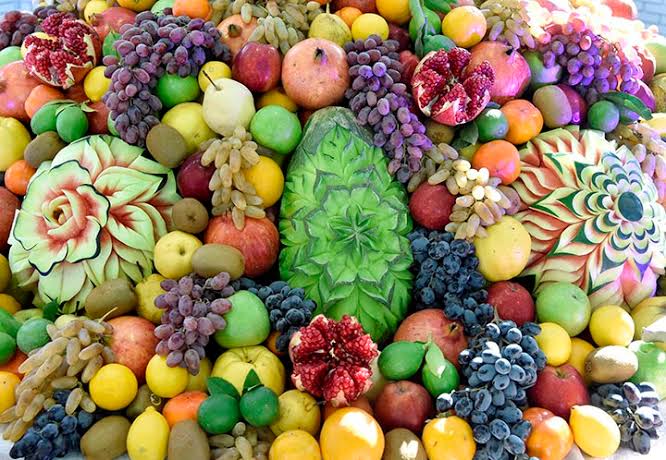Thanks to radical changes in the agricultural sector, carried out under the wise leadership of the President, the country has now achieved previously unknown results. Important components of success include the consistent introduction of innovations and advanced developments, modern achievements of science and technology into agriculture. Because, as the head of state noted, until we establish the scientific basis of agriculture, there will be no development in the field.
So, our enterprising farmers, relying on many years of work experience and modern knowledge of scientists and tireless efforts, achieved impressive results in 2023. Villagers in harmonious communication with nature find a common language with it. Everyone knows that last winter was harsh and abnormally cold. In the spring they were plagued by heavy rains and hail, in the summer they were overcome by heat and low water. This caused serious inconvenience to workers in the sphere.
However, thanks to the special attention of the state aimed at the growth and prosperity of agriculture, the benefits and preferences provided, dekhkans and farmers were able to achieve significant success in comparison with the previous year.
For example, this year farmers raised a large amount of 3 million 800 thousand tons of raw cotton and 8.2 million tons of grain. Over 15 million tons of vegetables and melons, five million tons of fruits and grapes, and four million tons of potatoes were grown. Similar positive dynamics were also observed in other sectors of the agricultural sector.
I would like to move away from the numbers and dwell in more detail on the components of growth. This year, a number of administrative reforms have been implemented in the agricultural sector. Unusual functions have been eliminated in management mechanisms and tasks and powers have been combined into a single system.
New mechanisms for financial support for agricultural producers have been introduced. In particular, livestock and greenhouse farms, cotton and textile clusters, and conditions have been created for the stable development of viticulture and winemaking, expanding the raw material base and export volumes, and providing the agricultural sector with modern resource-saving machinery and equipment.
It is worth noting the positive role of making appropriate decisions that provided freedom to farmers and dekhkans in choosing a crop for cultivation, placement of crops, and abolishing unjustified interference by government bodies.
Of course, a radical reform of the sphere based on the achievements of science, the use of advanced agricultural technologies, and systems of financial incentives for agricultural production had a positive effect.
As a result of the adoption of large-scale measures aimed at solving key issues (increasing soil fertility, raising the fight against land degradation to the level of state policy, maintaining the sustainability of the ecosystem), productivity increases. In 2023, the condition of soils on an area of one hundred thousand hectares was improved: these lands were returned to cultivation, vegetables and orchards were planted on them.
Thanks to the consistent implementation of modern scientific and innovative developments, the effective use of biological fertilizers and humus, soil fertility has increased, cotton yields have increased by 10 percent, grain crops by 20 percent, and vegetables and melons by 25-30 percent.
The population of our country is growing year by year. Therefore, along with the task of uninterrupted provision of agricultural products to compatriots, systematic work is required to create jobs in the agricultural sector. For example, it is worth noting that over the past two years, in order to ensure employment for villagers, reduce poverty and increase agricultural production, 200 thousand hectares of land previously occupied by cotton and grains have been taken out of circulation and distributed among 670 thousand fellow citizens. As a result, almost 2.2 million seasonal and permanent jobs were created and an additional three million tons of field products were produced. This also helps to increase the abundance of our dastarkhan.
In general, in 2023, about three million rural residents were provided with employment and received a source of income in the agricultural sector.
There is a popular wisdom “Gap sarishtada”, which roughly means “Strength is in order.” Due to the fact that about thirty years ago the state of work on storage, processing and delivery of field products grown by rural workers did not stand up to criticism, a considerable part of the harvest was lost. And now in rural areas the number of modern shopping and logistics centers, enterprises for advanced processing and storage of products is growing. As a result, a solid basis has been created for the development of the country’s export capabilities, along with a guaranteed supply of high-quality fruits and vegetables to the population. This year, fruit and vegetable processing capacity has reached 3.3 million tons per year, the number of agrilogistics centers has increased to 76, their total potential is almost a million tons of products.
We can proudly announce that this year we supplied $1.5 billion worth of agricultural products to almost 80 countries around the world. Now the products from the fields of Uzbekistan are sold on all continents.
Currently, over 800 clusters operate in all areas of agriculture, in particular cotton growing, grain growing, vegetable growing, horticulture, livestock farming, and sericulture. In cotton growing, one hundred percent of production comes from clusters, in the production of vegetables and fruits – 60 percent. The cluster method of producing field and farm products is being improved year after year. The head of our state dwelled on this in detail during a video conference on November 9, 2023 on improving the activities of cotton-textile clusters, supporting and increasing yields, and productivity of agricultural sectors. In particular, a decision was made to introduce a new system for organizing clusters and ensuring their interaction with farmers. From now on, farmers will be able to enter into futures contracts with any cluster within one region, as well as sell part of the harvest in excess of the futures through the exchange.
In short, these innovations in the system define new development horizons, which will make it possible in the coming year to achieve complete processing of cotton fiber within the country, the value of which will reach 9.6 billion dollars, and the export level will be 4.5 billion.
It is impossible to overestimate the role of agricultural machinery in the field; it is not without reason that they say: “Technology is the wings of a farmer.”
This year, in order to increase the level of technical equipment in the sector, over 10.5 thousand units of highly efficient equipment worth 2.5 trillion soums were supplied to clusters, farms and dekhkan farms.
As a result, it was possible to create opportunities to shorten the sowing season from 20 days to eight, harvesting grain crops from 30 to 16 days, and raising the plowed land in 20-25 days.
Thanks to the measures taken, for the first time in the history of New Uzbekistan, 25 percent of the harvest was harvested using machines.
So in the field of livestock farming, new systems have been created, and ample opportunities have been provided to farm workers by the state. This year, 70 thousand heads of breeding cattle, 180 thousand sheep and goats, and two million chickens were delivered to our country from foreign countries.
As a result of these measures, the number of improved purebred cattle in the republic was increased to 74 percent, the number of large livestock complexes in the regions reached 540 (although back in 2019 there were only 50). The abundance in markets and stores of meat and dairy products is the fruit of these efforts.
As in other industries, the state pays close attention to issues of digitalization in the agricultural sector. Last year, 10 new information and geographic information systems were introduced, which made it possible to increase the accuracy of information collected in the field and reduce the participation of the human factor in data collection processes. Work in this direction will continue consistently in the future.
Currently, the concern of the whole world, including our country, is caused by the problems of climate change, increasing scarcity of water resources, and desertification of territories, which poses challenges for workers in the sphere and agricultural scientists to solve them.
To prevent these threats and increase soil fertility, the priorities are the uninterrupted supply of resource-saving and highly efficient equipment, the introduction of agricultural technologies based on the experience of developed countries, increasing the volume of agricultural production, improving the quality of services provided and training highly qualified specialists.
At the same time as these current challenges, the limited supply chains for the development of the industry – the lack of direct access to seaports – shows the need to work with a new vision.
As the head of state says, each such challenge should be perceived as a new opportunity and, based on innovative approaches, turned into points of growth. In fact, if you think about it, even this challenge itself, which consists in the fact that our country is, as it were, double-locked, helps to save our land from technological threats and harm and, as a result, provides us with great opportunities to supply world markets with expensive, high-quality food products. The new advantages and opportunities of Uzbekistan in world markets lie precisely in this.
The only way to open up new opportunities, ensure added value and attractiveness of domestic agriculture is the widespread introduction of scientific achievements and innovations into the field, looking at every challenge from the point of view of emerging opportunities. The reason is that the country’s many thousands of agricultural workers are faced with important tasks to uninterruptedly supply the population of Uzbekistan with a variety of food products and contribute to increasing the economic power of our homeland. As one of the representatives of this sphere, I am confident that our hardworking and selfless farmers and agricultural scientists are fully capable of solving these honorable tasks.
Taking this opportunity, I would like to sincerely congratulate farmers, livestock breeders, silkworm breeders, irrigators, agronomists and machine operators, dedicated scientists, and agricultural workers on our professional holiday, and wish them health and prosperity.













